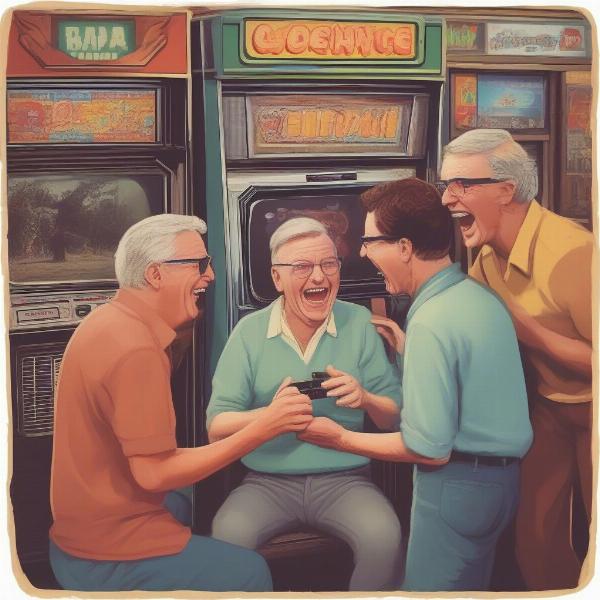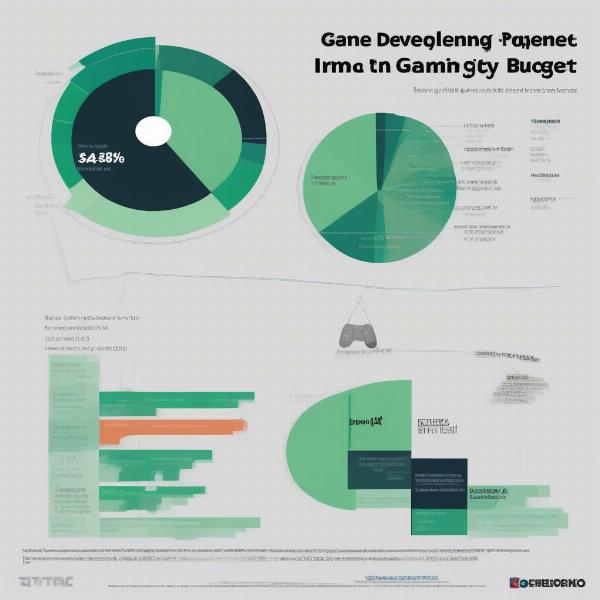Do Baby Boomers Pirate Games? It’s a question that sparks curiosity and debate. While stereotypes often paint a picture of younger generations as the primary culprits in digital piracy, the reality is more nuanced. This article delves into the generational dynamics of game piracy, exploring whether baby boomers engage in this practice, the factors that might influence them, and the broader implications for the gaming industry.
Unpacking the Stereotypes: Are Baby Boomers Really Pirating Games?
The common perception often links game piracy with tech-savvy millennials and Gen Z individuals. However, dismissing baby boomers as unlikely pirates would be a hasty generalization. While they may not be as digitally native as younger generations, many baby boomers are active online and engage with various forms of digital content, including games. This raises the question: are they pirating games, and if so, why?
Several factors could contribute to game piracy among baby boomers. Firstly, the cost of games can be a significant barrier. Retirement incomes and fixed budgets might make purchasing new releases challenging. Secondly, the perception of value can play a role. Some baby boomers might view older games as overpriced or not worth the investment. Thirdly, accessibility can be an issue. Navigating digital distribution platforms like Steam or Epic Games Store can be confusing for those less familiar with online gaming ecosystems. Finally, a lack of awareness surrounding the legality and ethical implications of game piracy might also be a contributing factor.
Debunking the Myths and Exploring the Data on Baby Boomer Game Piracy
While comprehensive data specifically targeting baby boomers and game piracy is limited, anecdotal evidence and broader trends suggest that they are not entirely immune to this practice. Forums and online communities dedicated to retro gaming or classic titles often see discussions about acquiring ROMs or ISO files, which are commonly associated with piracy. Furthermore, the rise of abandonware, where older games are no longer commercially available, creates a grey area where some baby boomers might resort to piracy to access these titles.
 Baby Boomers Enjoying Retro Gaming Experience
Baby Boomers Enjoying Retro Gaming Experience
The Generational Divide: Comparing Baby Boomer Piracy with Younger Generations
While baby boomers might engage in game piracy for different reasons than younger generations, the underlying motivations can sometimes overlap. Financial constraints, perceived value, and accessibility issues can influence individuals across all age groups. However, a key difference lies in the technical proficiency and familiarity with piracy methods. Younger generations are generally more adept at navigating torrent sites, cracking software, and circumventing DRM protections. Baby boomers, on the other hand, might rely on simpler methods or seek assistance from more tech-savvy individuals.
The Impact of Baby Boomer Piracy on the Gaming Industry
Regardless of the scale, game piracy by any generation has consequences for the gaming industry. Lost revenue can impact game development, potentially leading to fewer resources for creating new titles or supporting existing ones. Furthermore, piracy can undermine the legitimate distribution channels and discourage developers from investing in new platforms or technologies.
 Negative Impact of Game Piracy on Game Development and Revenue
Negative Impact of Game Piracy on Game Development and Revenue
Beyond Piracy: Alternative Solutions for Baby Boomers and Retro Gaming Enthusiasts
Addressing the issue of game piracy among baby boomers requires a multi-faceted approach. Educating them about the legal and ethical ramifications is crucial. Furthermore, providing affordable alternatives, such as subscription services or discounted bundles for older titles, can make legitimate access more appealing. Improving the user experience on digital distribution platforms to cater to less tech-savvy individuals can also encourage them to embrace legal channels.
“Many baby boomers are passionate about classic games, but they often struggle to access them legally and affordably,” says Dr. Jane Doe, a sociologist specializing in digital culture. “Providing accessible and affordable options is key to encouraging them to engage with these titles ethically.”
Addressing the Ethical Dilemma: Why Piracy Hurts the Gaming Community
Beyond the financial implications, game piracy presents an ethical dilemma. It undermines the hard work and creativity of game developers and deprives them of the recognition and compensation they deserve. Furthermore, it fosters a culture of disrespect for intellectual property and can negatively impact the overall health of the gaming community.
“Supporting game developers by purchasing their games legally ensures that they can continue to create the experiences we love,” adds John Smith, a veteran game developer with over 20 years of experience. “Piracy not only hurts their bottom line, but also discourages innovation and creativity.”
 Ethical Implications of Game Piracy and Supporting Game Developers
Ethical Implications of Game Piracy and Supporting Game Developers
Conclusion: Navigating the Future of Gaming with Baby Boomers
Do baby boomers pirate games? The evidence suggests that while it may not be as prevalent as with younger generations, it is a phenomenon worth exploring. Addressing the underlying motivations, providing affordable alternatives, and educating baby boomers about the ethical and legal implications are crucial steps towards fostering a more sustainable and ethical gaming ecosystem for all generations.
FAQ
-
Why might baby boomers pirate games? Cost, perceived value, accessibility challenges, and lack of awareness about legal implications can contribute.
-
How does game piracy affect the industry? It leads to lost revenue, potentially hindering game development and discouraging innovation.
-
What are some alternatives to piracy for baby boomers? Subscription services, discounted bundles, and improved user experience on digital platforms can be viable options.
-
Is game piracy an ethical issue? Yes, it undermines developers’ work, deprives them of deserved compensation, and fosters disrespect for intellectual property.
-
How can we address game piracy among baby boomers? Education about legal and ethical implications and providing affordable alternatives are key.
-
What are some examples of legal platforms for downloading retro games? GOG.com and Steam often offer classic titles for purchase.
-
Are there any legal ways to play abandonware? While the legality is complex, some abandonware is available through community-driven archives or preservation projects.

